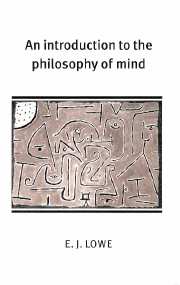Book contents
9 - Action, intention and will
Published online by Cambridge University Press: 05 June 2012
Summary
An important point which emerged from the last chapter is that even so ‘intellectual’ an aspect of the human mind as our ability to reason cannot be divorced from our nature as autonomous goal-seeking creatures endowed with complex motivational states, involving intentions, sensations and emotions. Even purely theoretical reasoning, which aims at truth, is a goal-directed activity which requires motivation. Nor can we simply aim at truth in the abstract. Advance in the sciences is made by focusing on particular problems, which have to be perceived as problems if investigators are to be motivated to attempt to solve them. Human beings, like other primates, are creatures naturally endowed with a high degree of curiosity. A being devoid of all curiosity could never engage in processes of reasoning, for it would have no motive to form hypotheses, to seek empirical data in confirmation or refutation of them, or to select certain propositions as the premises of an argument. Human curiosity is a trait which, in all probability, our evolutionary history has conferred upon us as a consequence of natural selection. Curiosity may have killed the cat, as the saying goes, but if, as seems plausible, a moderately high degree of curiosity tends to increase a creature's chances of survival, we modern humans may well have it at least partly because our ancestors' less curious rivals did not survive to pass on their genes.
- Type
- Chapter
- Information
- An Introduction to the Philosophy of Mind , pp. 230 - 263Publisher: Cambridge University PressPrint publication year: 2000



